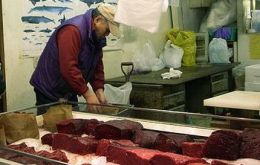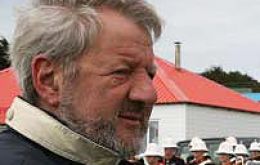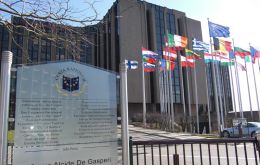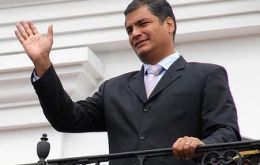MercoPress. South Atlantic News Agency
Stories for February 18th 2011
-
Friday, February 18th 2011 - 06:00 UTC
Japan announces the end of its annual whale hunt in Antarctica

Japan ended its annual whale hunt in Antarctica early following clashes between its fleet and protesters, Agriculture Minister Michihiko Kano said.
-
Friday, February 18th 2011 - 05:50 UTC
Chilean journalist reflects on Falklands’ sovereignty dispute

The benefit of encouraging opinion makers to visit the Falklands was demonstrated when an article translated as “Petrol sets the Falklands on fire” appeared on the website lanacion.cl, written by recent visitor and Chilean writer and journalist, Raúl Sohr.
-
Friday, February 18th 2011 - 05:23 UTC
European MPs warn about “a flood of meat imports” from Mercosur

Members from the European Parliament representing rural constituencies have come out strongly against a possible trade deal between Europe and Mercosur arguing that an influx of meat imports could have a devastating impact on the EU beef industry.
-
Friday, February 18th 2011 - 05:13 UTC
US inflation pushed by food and fuel prices increases 0.4% in January

United States prices rose 0.4% in January compared with the previous month, mostly due to rising food and fuel prices. The rate of change was the same as seen in December.
-
Friday, February 18th 2011 - 05:05 UTC
European Commission told to tighten controls on aid to avoid ‘waste and leakage’

The European Court of Auditors has called on the European Commission to assess the high risks involved, including corruption, when large sums of EC aid are channelled directly through public budgets in developing countries in Latin America, Africa and Asia.
-
Friday, February 18th 2011 - 04:59 UTC
Ecuadorian president closer to tighter grip of government, including the Judiciary

Ecuador's constitutional Court approved this week a 10-question referendum that will let voters decide whether to ban gambling and bullfighting but also ask them to boost President Rafael Correa's power over the judiciary.
-
Friday, February 18th 2011 - 04:55 UTC
EU/Korea trade agreement effective next July; eliminates 98% of barriers

Having pushed through a strong safeguard clause to protect European industry and received guarantees from Seoul that the new Korean legislation on car CO2 emission limits would not be detrimental to European car makers, the Parliament on gave its consent to the most ambitious trade agreement the EU has ever negotiated.
-
Friday, February 18th 2011 - 04:51 UTC
IMF calls for fiscal discipline and a “weaker dollar” ahead of G20 meeting

The International Monetary Fund will warn G20 finance ministers this weekend of growing risks to the world economy from surging food prices and public finances while also advocating a somewhat weaker dollar.
-
Friday, February 18th 2011 - 04:43 UTC
Paraguay fearful of “Brazilian dominance” reveals Wikileaks cable

Paraguay expressed deep concern about “Brazilian dominance” in South America, reveals a diplomatic cable exposed by Wikileaks and reproduced this week by the Brazilian portal ‘Opera Mundi’.
-
Friday, February 18th 2011 - 04:17 UTC
Ozone layer future recovery linked to climate change, says reports

A report sponsored by the UN Environment Program finds that over the past decade, global ozone levels, and ozone levels in the Arctic and Antarctic regions are at a turnaround point -- no longer decreasing but not yet increasing.
